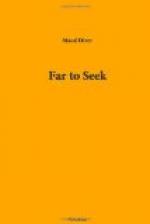They found Lahore still dancing, sublimely unconcerned. Instinctively, Roy looked round for Lance. No sign of him in the ballroom or the card-room. And the crowded place seemed empty without him. It was queer.
Later on, he ran up against Barnard, who told him that Lance had gone home.
CHAPTER VII
“Of the unspoken
word thou art master. The spoken word is master
of
thee.”—Arab
Proverb.
Roy drove home with Barnard in the small hours, still too overwrought for clear thinking, and too exhausted all through to lie awake for five minutes after his head touched the pillow. For the inner stress and combat had been sharper than he knew.
He woke late to find Terry curled up against his legs, and the bungalow empty of human sounds. The other three were up long since, and gone to early parade. His head was throbbing. He felt limp, as if all the vigour had been drained out of him. And suddenly ... he remembered....
Not in a lover’s rush of exaltation, but with a sharp reaction almost amounting to fear, the truth dawned on him that he was no longer his own man. In a passionate impulse, he had virtually surrendered himself and his future into the hands of a girl whom he scarcely knew. He still saw the whole thing as mainly her doing—and it frightened him. Looking backward over the past weeks, reviewing the steps by which he had arrived at last night’s involuntary culmination, he felt more frightened than ever.
And yet—there sprang a vision of her, pale and gracious in the starshine, when she leaned to him at parting....
She was wonderful and beautiful—and she was his. Any man worth his salt would feel proud. And he did feel proud—in the intervals of feeling horribly afraid of himself and her. Especially her. Girls were amazing things. You seized hold of one and spoke mad words, and nearly crushed the life out of her, and she took it almost as calmly as if you had asked for an extra dance. Was it a protective layer of insensibility—or super-normal self-control? Would she, Rose, have despised him had she guessed that even at the height of his exultation he had felt ashamed of having let himself go so completely; and that before there had been any word of marriage—any clear desire of it even in the deep of his heart?
That was really the root of his trouble. The passing recoil from an ardent avowal is no uncommon experience with the finer types of men. But, to Roy, it seemed peculiarly unfitting that the son of his mother should, as it were, stumble into marriage in a headlong impulse of passion, on a superficial six weeks’ acquaintance; and the shy, spiritual side of him felt alarmed, restive, even a little repelled.
In a measure, Rose was right when she dubbed him fakir. Artist though he was, and all too human, there lurked in him a nascent streak of the ascetic, accentuated by his mother’s bidding, and his own strong desire to keep in touch with her and with things not seen.




